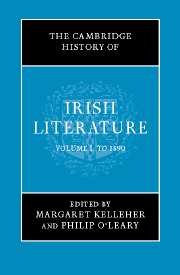Book contents
- Frontmatter
- Introduction
- 1 The literature of medieval Ireland to c. 800: St Patrick to the Vikings
- 2 The literature of medieval Ireland, 800–1200: from the Vikings to the Normans
- 3 The literature of later medieval Ireland, 1200–1600: from the Normans to the Tudors
- 4 Literature in English, 1550–1690: from the Elizabethan settlement to the Battle of the Boyne
- 5 Literature in Irish, c.1550–1690: from the Elizabethan settlement to the Battle of the Boyne
- 6 Prose in English, 1690–1800: from the Williamite wars to the Act of Union
- 7 Poetry in English, 1690–1800: from the Williamite wars to the Act of Union
- 8 Literature in Irish, 1690–1800: from the Williamite wars to the Act of Union
- 9 Theatre in Ireland, 1690–1800: from the Williamite wars to the Act of Union
- 10 Irish Romanticism, 1800–1830
- 11 Prose writing and drama in English, 1830–1890: from Catholic emancipation to the fall of Parnell
- 12 Poetry in English, 1830–1890: from Catholic emancipation to the fall of Parnell
- 13 Literature in Irish, 1800–1890: from the Act of Union to the Gaelic League
- 14 Historical writings, 1690–1890
- 15 Literature and the oral tradition
- Guide to major subject areas
- Index
- References
8 - Literature in Irish, 1690–1800: from the Williamite wars to the Act of Union
Published online by Cambridge University Press: 28 March 2008
- Frontmatter
- Introduction
- 1 The literature of medieval Ireland to c. 800: St Patrick to the Vikings
- 2 The literature of medieval Ireland, 800–1200: from the Vikings to the Normans
- 3 The literature of later medieval Ireland, 1200–1600: from the Normans to the Tudors
- 4 Literature in English, 1550–1690: from the Elizabethan settlement to the Battle of the Boyne
- 5 Literature in Irish, c.1550–1690: from the Elizabethan settlement to the Battle of the Boyne
- 6 Prose in English, 1690–1800: from the Williamite wars to the Act of Union
- 7 Poetry in English, 1690–1800: from the Williamite wars to the Act of Union
- 8 Literature in Irish, 1690–1800: from the Williamite wars to the Act of Union
- 9 Theatre in Ireland, 1690–1800: from the Williamite wars to the Act of Union
- 10 Irish Romanticism, 1800–1830
- 11 Prose writing and drama in English, 1830–1890: from Catholic emancipation to the fall of Parnell
- 12 Poetry in English, 1830–1890: from Catholic emancipation to the fall of Parnell
- 13 Literature in Irish, 1800–1890: from the Act of Union to the Gaelic League
- 14 Historical writings, 1690–1890
- 15 Literature and the oral tradition
- Guide to major subject areas
- Index
- References
Summary
Practical as well as conceptual difficulties lie in the way of describing this phase of writing in the Irish language. More manuscript sources survive for the eighteenth and nineteenth centuries together than for any other stage in the Gaelic past. While influenced by print and showing traces of interaction with the oral world, barriers to publishing, accompanied, paradoxically, by the spread of literacy, ensured that the handwritten documentary tradition inherited from medieval times remained the main means of transmission for all forms of creative composition. Most of these original codices have yet to be described (properly or even at all), with their full complement of texts professionally extracted from them. Work in this regard has been under way, particularly from the beginning of the 1900s, approximately, but it too poses its own problems. Early twentieth-century scholarship is characterised by the shortcomings of a newly developing domain: incompleteness of coverage, the tentative nature of either text or translation, and the restricted context in which the material is discussed. Because these editions are often still the only immediate point of contact with the evidence, the present chapter will have to rely on them frequently (and does not underestimate their considerable strengths), without the opportunity to comment in full on any identifiable deficiencies. A brocade of previously unpublished original material must therefore be introduced from time to time to augment the account where necessary.
- Type
- Chapter
- Information
- The Cambridge History of Irish Literature , pp. 320 - 371Publisher: Cambridge University PressPrint publication year: 2006
References
- 3
- Cited by



